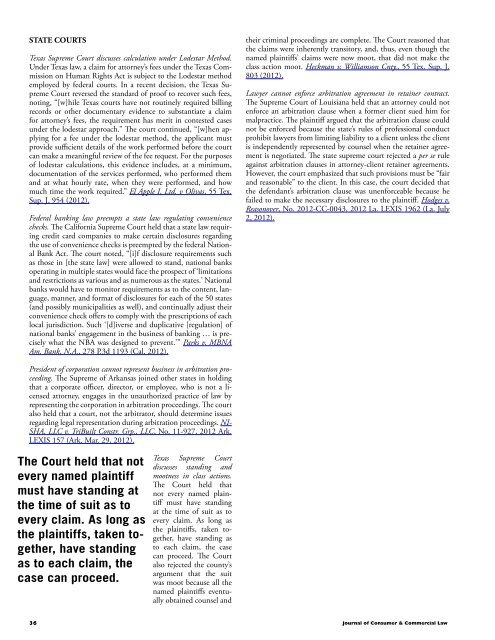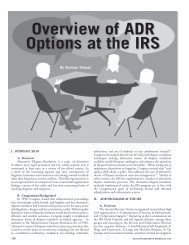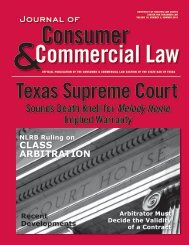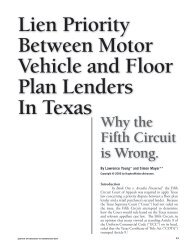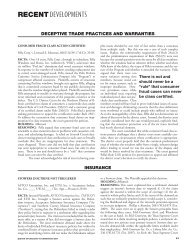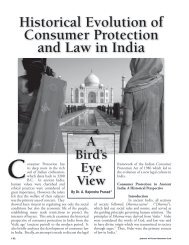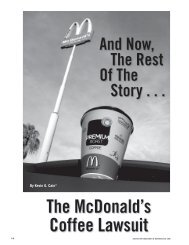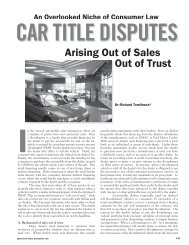Teaching Consumer Credit Law in an Evolving Australian Economy
Teaching Consumer Credit Law in an Evolving Australian Economy
Teaching Consumer Credit Law in an Evolving Australian Economy
Create successful ePaper yourself
Turn your PDF publications into a flip-book with our unique Google optimized e-Paper software.
STATE COURTS<br />
Texas Supreme Court discusses calculation under Lodestar Method.<br />
Under Texas law, a claim for attorney’s fees under the Texas Commission<br />
on Hum<strong>an</strong> Rights Act is subject to the Lodestar method<br />
employed by federal courts. In a recent decision, the Texas Supreme<br />
Court reversed the st<strong>an</strong>dard of proof to recover such fees,<br />
not<strong>in</strong>g, “[w]hile Texas courts have not rout<strong>in</strong>ely required bill<strong>in</strong>g<br />
records or other documentary evidence to subst<strong>an</strong>tiate a claim<br />
for attorney’s fees, the requirement has merit <strong>in</strong> contested cases<br />
under the lodestar approach.” The court cont<strong>in</strong>ued, “[w]hen apply<strong>in</strong>g<br />
for a fee under the lodestar method, the applic<strong>an</strong>t must<br />
provide sufficient details of the work performed before the court<br />
c<strong>an</strong> make a me<strong>an</strong><strong>in</strong>gful review of the fee request. For the purposes<br />
of lodestar calculations, this evidence <strong>in</strong>cludes, at a m<strong>in</strong>imum,<br />
documentation of the services performed, who performed them<br />
<strong>an</strong>d at what hourly rate, when they were performed, <strong>an</strong>d how<br />
much time the work required.” El Apple I, Ltd. v Olivas, 55 Tex.<br />
Sup. J. 954 (2012).<br />
Federal b<strong>an</strong>k<strong>in</strong>g law preempts a state law regulat<strong>in</strong>g convenience<br />
checks. The California Supreme Court held that a state law requir<strong>in</strong>g<br />
credit card comp<strong>an</strong>ies to make certa<strong>in</strong> disclosures regard<strong>in</strong>g<br />
the use of convenience checks is preempted by the federal National<br />
B<strong>an</strong>k Act. The court noted, “[i]f disclosure requirements such<br />
as those <strong>in</strong> [the state law] were allowed to st<strong>an</strong>d, national b<strong>an</strong>ks<br />
operat<strong>in</strong>g <strong>in</strong> multiple states would face the prospect of ‘limitations<br />
<strong>an</strong>d restrictions as various <strong>an</strong>d as numerous as the states.’ National<br />
b<strong>an</strong>ks would have to monitor requirements as to the content, l<strong>an</strong>guage,<br />
m<strong>an</strong>ner, <strong>an</strong>d format of disclosures for each of the 50 states<br />
(<strong>an</strong>d possibly municipalities as well), <strong>an</strong>d cont<strong>in</strong>ually adjust their<br />
convenience check offers to comply with the prescriptions of each<br />
local jurisdiction. Such ‘[d]iverse <strong>an</strong>d duplicative [regulation] of<br />
national b<strong>an</strong>ks’ engagement <strong>in</strong> the bus<strong>in</strong>ess of b<strong>an</strong>k<strong>in</strong>g … is precisely<br />
what the NBA was designed to prevent.’” Parks v. MBNA<br />
Am. B<strong>an</strong>k, N.A., 278 P.3d 1193 (Cal. 2012).<br />
their crim<strong>in</strong>al proceed<strong>in</strong>gs are complete. The Court reasoned that<br />
the claims were <strong>in</strong>herently tr<strong>an</strong>sitory, <strong>an</strong>d, thus, even though the<br />
named pla<strong>in</strong>tiffs’ claims were now moot, that did not make the<br />
class action moot. Heckm<strong>an</strong> v. Williamson Cnty., 55 Tex. Sup. J.<br />
803 (2012).<br />
<strong>Law</strong>yer c<strong>an</strong>not enforce arbitration agreement <strong>in</strong> reta<strong>in</strong>er contract.<br />
The Supreme Court of Louisi<strong>an</strong>a held that <strong>an</strong> attorney could not<br />
enforce <strong>an</strong> arbitration clause when a former client sued him for<br />
malpractice. The pla<strong>in</strong>tiff argued that the arbitration clause could<br />
not be enforced because the state’s rules of professional conduct<br />
prohibit lawyers from limit<strong>in</strong>g liability to a client unless the client<br />
is <strong>in</strong>dependently represented by counsel when the reta<strong>in</strong>er agreement<br />
is negotiated. The state supreme court rejected a per se rule<br />
aga<strong>in</strong>st arbitration clauses <strong>in</strong> attorney-client reta<strong>in</strong>er agreements.<br />
However, the court emphasized that such provisions must be “fair<br />
<strong>an</strong>d reasonable” to the client. In this case, the court decided that<br />
the defend<strong>an</strong>t’s arbitration clause was unenforceable because he<br />
failed to make the necessary disclosures to the pla<strong>in</strong>tiff. Hodges v.<br />
Reasonover, No. 2012-CC-0043, 2012 La. LEXIS 1962 (La. July<br />
2, 2012).<br />
President of corporation c<strong>an</strong>not represent bus<strong>in</strong>ess <strong>in</strong> arbitration proceed<strong>in</strong>g.<br />
The Supreme of Ark<strong>an</strong>sas jo<strong>in</strong>ed other states <strong>in</strong> hold<strong>in</strong>g<br />
that a corporate officer, director, or employee, who is not a licensed<br />
attorney, engages <strong>in</strong> the unauthorized practice of law by<br />
represent<strong>in</strong>g the corporation <strong>in</strong> arbitration proceed<strong>in</strong>gs. The court<br />
also held that a court, not the arbitrator, should determ<strong>in</strong>e issues<br />
regard<strong>in</strong>g legal representation dur<strong>in</strong>g arbitration proceed<strong>in</strong>gs. NI-<br />
SHA, LLC v. TriBuilt Constr. Grp., LLC, No. 11-927, 2012 Ark.<br />
LEXIS 157 (Ark. Mar. 29, 2012).<br />
The Court held that not<br />
every named pla<strong>in</strong>tiff<br />
must have st<strong>an</strong>d<strong>in</strong>g at<br />
the time of suit as to<br />
every claim. As long as<br />
the pla<strong>in</strong>tiffs, taken together,<br />
have st<strong>an</strong>d<strong>in</strong>g<br />
as to each claim, the<br />
case c<strong>an</strong> proceed.<br />
Texas Supreme Court<br />
discusses st<strong>an</strong>d<strong>in</strong>g <strong>an</strong>d<br />
mootness <strong>in</strong> class actions.<br />
The Court held that<br />
not every named pla<strong>in</strong>tiff<br />
must have st<strong>an</strong>d<strong>in</strong>g<br />
at the time of suit as to<br />
every claim. As long as<br />
the pla<strong>in</strong>tiffs, taken together,<br />
have st<strong>an</strong>d<strong>in</strong>g as<br />
to each claim, the case<br />
c<strong>an</strong> proceed. The Court<br />
also rejected the county’s<br />
argument that the suit<br />
was moot because all the<br />
named pla<strong>in</strong>tiffs eventually<br />
obta<strong>in</strong>ed counsel <strong>an</strong>d<br />
36 Journal of <strong>Consumer</strong> & Commercial <strong>Law</strong>


